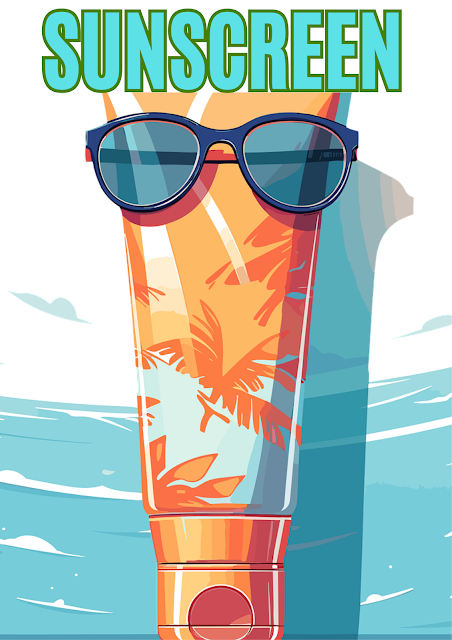Sunscreen: Protection Against Harmful UV Rays
Sunscreen is an essential component of skincare that helps protect the skin from the harmful effects of ultraviolet (UV) rays. Regular use of sunscreen can prevent sunburn, premature aging, and even skin cancer. But while topical application is vital, certain foods rich in skin-nourishing nutrients can enhance your skin's resilience against sun damage.
What is Sunscreen?
Sunscreen is a topical product that contains active ingredients to block or absorb UV radiation from the sun. UV radiation is divided into two main types:
- UVA Beams: Enter profound into the skin, causing untimely maturing and wrinkling.
- UVB Rays: Affect the skin's outer layer, leading to sunburn and increasing the risk of skin cancer.
Benefits of Sunscreen
1. Prevents Sunburn
Sunburn is the immediate damage caused by excessive UVB exposure. Regular sunscreen use can minimize this risk.
2. Reduces Skin Cancer Risk
According to the American Academy of Dermatology (AAD), daily sunscreen application reduces the risk of developing melanoma, the deadliest form of skin cancer【1】.
3. Slows Premature Aging
UVA rays accelerate photoaging, leading to wrinkles, dark spots, and loss of elasticity. Sunscreen helps preserve a youthful complexion.
4. Maintains an Even Skin Tone
Sunscreen prevents hyperpigmentation caused by UV exposure, helping maintain an even complexion.
Types of Sunscreen
1. Physical Sunscreens
- Active Ingredients: Zinc oxide, titanium dioxide.
- How They Work: Create a physical barrier on the skin that reflects UV rays.
- Best For: Sensitive skin, as they are less likely to cause irritation.
2. Chemical Sunscreens
- Active Ingredients: Avobenzone, oxybenzone, octisalate, and others.
- How They Work: Absorb UV rays and convert them into heat, which is released from the skin.
- Best For: Normal to oily skin, as they are lightweight and easy to apply.
3. Broad-Spectrum Sunscreens
- Offer protection against both UVA and UVB rays, ensuring comprehensive coverage.
How to Choose the Right Sunscreen
- SPF Value: Choose sunscreen with an SPF of at least 30, which blocks 97% of UVB rays. Higher SPFs provide slightly better protection.
- Water Resistance: Opt for water-resistant sunscreen if you're swimming or sweating.
- Dry skin: Search for saturating sunscreens with fixings like hyaluronic corrosive.
- Oily skin: Choose oil-free, non-comedogenic formulations.
- Broad-Spectrum Protection: Ensure the label mentions UVA and UVB protection.
Tips for Proper Sunscreen Application
- Apply Generously: Use about a teaspoon for the face and two tablespoons for the body.
- Reapply Often: Reapply every two hours or immediately after swimming or sweating.
- Don’t Skip Cloudy Days: Up to 80% of UV rays penetrate clouds.
- Layer Accurately: Apply sunscreen as the last move toward your morning skincare schedule, before cosmetics.
Foods to Enhance Skin's Natural Defense Against Sun Damage
While sunscreen is the primary defense, certain foods can help protect the skin internally. These foods are rich in antioxidants and nutrients that reduce oxidative stress and inflammation caused by UV exposure.
1. Tomatoes
- Nutrient: Lycopene, a powerful antioxidant.
- Benefit: Reduces sunburn severity and neutralizes free radicals caused by UV rays【2】.
2. Carrots and Sweet Potatoes
- Nutrient: Beta-carotene, a precursor to vitamin A.
- Benefit: Enhances the skin's natural UV defense and reduces sensitivity to sunlight【3】.
3. Citrus Fruits
4. Green Tea
- Nutrient: Polyphenols, particularly EGCG (epigallocatechin gallate).
- Benefit: Reduces inflammation and DNA damage caused by UV exposure【4】.
5. Fatty Fish
- Nutrient: Omega-3 fatty acids.
- Benefit: Reduces inflammation and prevents the breakdown of collagen and elastin in the skin.
6. Dark Chocolate
- Nutrient: Flavonoids.
- Benefit: Improves skin hydration and increases resistance to UV rays【5】.
7. Leafy Greens
- Nutrient: Lutein and zeaxanthin.
- Benefit: Protects the skin from oxidative stress caused by UV exposure.
8. Nuts and Seeds
- Nutrient: Vitamin E.
- Benefit: Neutralizes free radicals and helps repair sun-damaged skin.
Foods to Avoid
Some foods can exacerbate skin sensitivity to sunlight. Avoiding or limiting these can support your sun protection efforts:
- Alcohol: Dehydrates the skin, making it more prone to damage.
- Sugary Foods: High sugar levels accelerate glycation, weakening skin structure.
- Processed Foods: Additives and preservatives may increase inflammation in the skin.
The Role of Antioxidants in Sun Protection
Antioxidants play a crucial role in protecting the skin from sun damage by neutralizing free radicals generated by UV radiation. Topical antioxidants like vitamin C and E, combined with sunscreen, offer enhanced protection.
Scientific Evidence Supporting Sunscreen Use
- A study in JAMA Dermatology demonstrated that daily sunscreen use reduces the risk of melanoma by 50%【6】.
- Research published in The American Journal of Clinical Nutrition highlighted the photoprotective effects of lycopene and beta-carotene-rich diets【7】.
Final Thoughts
Sunscreen is indispensable for protecting your skin from the harmful effects of UV rays. Incorporating a nutrient-rich diet with antioxidant-packed foods like tomatoes, carrots, and green tea can complement sunscreen use by enhancing your skin's resilience against sun damage.
Make sunscreen application a daily habit, and choose formulations suited to your skin type for maximum effectiveness. Furthermore, counsel a dermatologist in the event that you have explicit skin concerns or need customized sunscreen suggestions.
References
- American Academy of Dermatology. “Sunscreen FAQs.”
- Stahl, W., & Sies, H. (2007). "Carotenoids and flavonoids contribute to UV protection." Photochemical & Photobiological Sciences.
- Mathews-Roth, M. M. (1991). "Beta-carotene therapy for photosensitivity diseases." Journal of Dermatological Treatment.
- Katiyar, S. K. (2003). "Green tea and skin photoprotection." Antioxidants & Redox Signaling.
- Heinrich, U., et al. (2006). "Flavonoid-rich cocoa improves skin condition and reduces skin sensitivity to UV light." The Journal of Nutrition.
- Green, A., et al. (1999). "Daily sunscreen application and betacarotene supplementation in prevention of basal-cell and squamous-cell carcinomas of the skin: a randomized controlled trial." The Lancet.
- Rizwan, M., et al. (2011). "Tomato paste rich in lycopene protects against cutaneous photodamage in humans." The British Journal of Dermatology.
